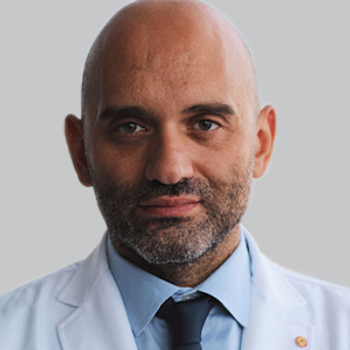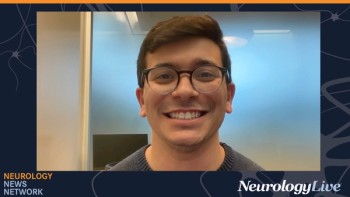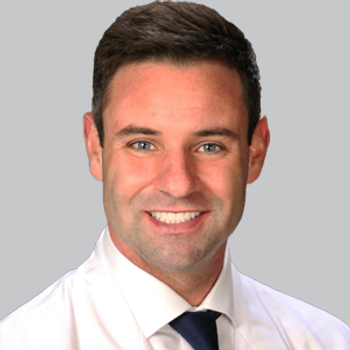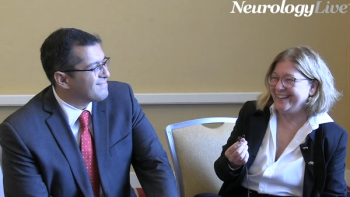
The consultant neurologist and senior lecturer at St. Georges Hospital in London, provided commentary on the diagnosis, management, and future research around neuropsychiatric symptoms of Parkinson disease.

The consultant neurologist and senior lecturer at St. Georges Hospital in London, provided commentary on the diagnosis, management, and future research around neuropsychiatric symptoms of Parkinson disease.

A recent survey showed that patients with Parkinson disease quickly adapted to using continuous subcutaneous apomorphine infusion therapy, with high amount of recommending the device to others.

Amantadine extended-release capsules, approved for levodopa-related dyskinesia and OFF episodes in Parkinson disease, offer high amantadine concentrations that peak in the time of first morning levodopa dose.

The chief medical officer and chief development officer at BlueRock Therapeutics provided perspective on newly presented data investigating a cell therapy for patients with Parkinson disease. [WATCH TIME: 4 minutes]

Nina Riggins, MD, PhD, FAAN, FAHS, UCNS Diplomate, highlighted the essential role of advocacy in advancing neurological care, particularly in improving the transition process for pediatric patients with migraine to adult care.

ELATE, a multicenter, randomized, double-blind, placebo-controlled trial, aims to address the limitations of current oral therapies by exploring a targeted, localized treatment option.

As part of our monthly clinician spotlight, NeurologyLive® highlighted neuromuscular-associated cardiomyopathy expert Forum Kamdar, MD, PhD, FACC, FHFSA, an advanced heart failure physician-scientist at the University of Minnesota.

Kelly Brazzo, founder and CEO of CureLGMD2i Foundation, and Dennis Akkaya, chief Commercial Officer at MyTomorrows, share insight on a new partnership that aims to ease accessibility to drug development trials for patients with LGMD.

In a post hoc analysis of the COSMOS study, 24-hour LCIG infusion led to a reduction in nocturnal and morning akinesia, though many patients continued to rely on nighttime add-on medications.

Here's some of what is coming soon to NeurologyLive® this week.

The neuropharmacologist at the University of Lille, in France, provided commentary on promising results from the phase 1/2 DIVE-I trial assessing the safety and efficacy of a device-assisted therapy in Parkinson disease. [WATCH TIME: 6 minutes]

While participants responded positively to nutritional guidance and the Mediterranean diet, they expressed negative views on the ketogenic diet due to its restrictive nature, social impracticality, and gastrointestinal side effects of MCT oil.

Patients reported increased good ON time and improved confidence in daily activities while experiencing a lower treatment burden compared to their previous medication regimens.

Test your neurology knowledge with NeurologyLive®'s weekly quiz series, featuring questions on a variety of clinical and historical neurology topics. This week's topic is on cryptogenic stroke.

Lu AF84222 was considered well tolerated, with greater treatment effects observed in a subgroup of patients with less impaired multiple system atrophy.

Path to Prevention is a platform, phase 2 trial that will investigate the safety and efficacy of investigational interventions in patients neuronal α-synuclein disease stage 2B.

Findings from a new study presented at MDS 2024 suggest that variations in cholinergic denervation patterns may hold promise for differentiating Parkinson disease and progressive supranuclear palsy with parkinsonism.

Despite showing no differences vs placebo on the primary end point of gait parameters, TAK-071-treated patients demonstrated significant improvements in global cognition score.

Neurology News Network. for the week ending September 28, 2024. [WATCH TIME: 4 minutes]

Change from baseline in Myasthenia Gravis Activities of Daily Living score was statistically significant for inebilizumab-treated patients and the therapy showed a safe and well-tolerated profile without new safety signals.

Take 5 minutes to catch up on NeurologyLive®'s highlights from the week ending September 27, 2024.

Tim Miller, MD, director of functional neurosurgery at the Marcus Neuroscience Institute, Baptist Health, provided commentary on the use of HIFU as a non-invasive treatment for patients with essential tremor and specific types of Parkinson disease.

The consultant neurologist at Queen's Square MS Center in London gave his clinical viewpoint on the newest revision of the McDonald criteria for diagnosing patients with multiple sclerosis. [WATCH TIME: 3 minutes]

Innovative neurosurgical advances in imaging/mapping, robotic assistance, and extended reality enable surgeons to more precisely and effectively treat neurological conditions such as brain tumor, epilepsy, Parkinson Disease, and stroke, giving patients new hope and a chance for more successful outcomes.

Results from the phase 3 TEMPO-2 trial, an additional study assessing tavapadon as a flexible-dose monotherapy, are expected by the end of this year.

A pair of neurologists from the University of California, Irvine, detailed some of the training and career focuses of large federal agencies in effort to address the shortage of neurologists. [WATCH TIME: 4 minutes]

RNS60 may lengthen survival by slowing FVC progression, particularly in participants with low NfL and MCP-1 levels at baseline, suggesting a potential target subgroup for future studies.

The chief research officer of the Muscular Dystrophy Association talked about what is to be expected at the 2025 MDA Conference, held March 16-19, in Dallas, Texas. [WATCH TIME: 5 minutes]

The company expects to complete the trial in Q1 2025 and anticipates it will use the feedback from regulators to guide an accelerated approval.

The approval follows phase 3 data that showed significant improvements in neurological symptoms and functional benefit over 12 weeks in patients with Niemann-Pick disease type C.